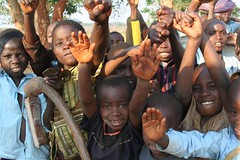
Click on pic to see slideshow
or here to access the set
Our arrival at the Sinda primary school, in a rural area close to the provincial capital Chipata, created a major commotion among students and teachers alike; most of them had probably never seen white people before. The class schedule was disrupted for the rest of the day. We gradually warmed up to their enthusiastic, chaotic welcome, while they were storming the truck looking at us as if we were monkeys from outer space. At first, the deep, honest, scared gazes of the little ones and the eagerness of the older ones to get our attention were quite confusing. What should we tell them? What if they ask for money? How can we help all these barefooted, orphaned children, the young pregnant mothers, and the adolescents already convinced that the only future open for them is to stay in the village and work the land?
The young ones, grades 1 to 4, only spoke the local language, Chichewa. The older kids spoke English too – the official language of Zambia - some of them quite well. They did not tire of posing to the camera, scurrying back to us after each shot to see the pictures on the small camera screen. They looked at us amazed and curious when we were setting up our tents in the schoolyard and they laughed and giggled like guilty rascals when they were allowed inside by Angela, five or six at a time. Later on we played soccer with the older kids. I spat my lungs out running and tried not to make a fool out of myself, but these boys were fast runners and I could barely compete with them.
When it got dark we stopped playing and had dinner with some of the teachers in the schoolyard by the truck, and talked school issues. But as the headmaster and the older teachers took their leave of us and went home, it became apparent that there was more than school on the minds of the younger teachers and the few older students who had remained at the school to talk to us: they all wanted to marry Jacqueline and Andrea, the two single women in our group, who had become the stars of the evening. Angela and I discussed marriage matters with some of them. It appears that here, as in much of rural Africa, brides are bought from their families by means of a dowry. A young teacher asked me “how much have you paid for this one,” pointing to Angela. I told him joking that I got her for free. He gave me a look of disbelief for a moment… but he had already established that white people are weird, so he probably took it for true. I didn’t tell him about all the money white people spend on courtship, wining and dining, on all the presents and the culmination of all spending outrages, the wedding. He could have thought white people were not only weird, but patently insane.
The next day started with a visit to the school during classes. The classrooms were just bare, cracked walls covered by corrugated tin roofs. Beside the chipped blackboards and the nicked desks carved with their pencils by generations of pupils, the only other things in the rooms were a few educational hand-drawings on the walls, some of them quite nice. We stood in the yard as they all sang for us before class, we visited a few classrooms and listened to the teachers instructing the students who were too busy looking at us to pay attention to them. I even taught a little math by explaining a division example at the blackboard. I don’t know if they understood my way of dividing integers, but they were active and answered when I asked questions.
We donated notebooks, pencils and pens for the school to the professors assembled in the headmaster’s office, and Angela and I gave them 100,000 kwacha (about $25) for a good soccer ball – Angela had this idea after a conversation with one of the teachers about what keeps children at school – it turns out that playing soccer after class is one factor that contributes to increased attendance. We left among the general joy, children waving hands at us and faces glued to the classroom windows. We’ll be food for schoolyard chatter and good memories for a while. I’m sure we left behind a few broken hearts as well. But most of all, I hope we brought some lasting smiles…
Posted from Stone Town, Zanzibar


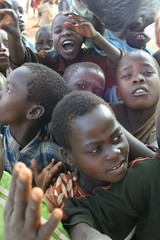

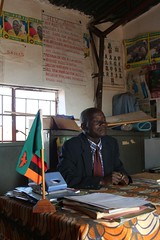
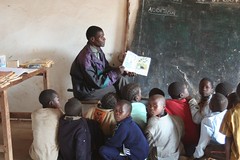
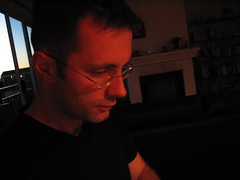
4 comments:
Out of all of your travels and adventures so far, this would be the one that I would be most envious of...and the one that made me tear/smile while reading of your experience with the children ...
This was a beautiful evening; for once we got to know the people instead of running for the perfect shot of a lion.
Do we know each other?
Cheers!
Super! Peu de choses apportent parfois tellement...
Les sourires des enfants n ont pas de prix ;-)
Je pense que quand tu visites un pays, il faut aussi rencontrer la population. Ce n est que comme ca que tu peux apprecier ou non le pays dans son entier.
Sam
Yes, we know each other. It's Angela... the other one.. :) Sorry didn't check this/respond earlier...but of course it's been an interesting ride as of late...both personal and professional.. Once life settles down a bit... Hopefully soon... I know at least one factor will be gone for 3 weeks this coming Sunday... I'll send you an e-mail where the whole world can not see it.. :) Miss you!
Post a Comment